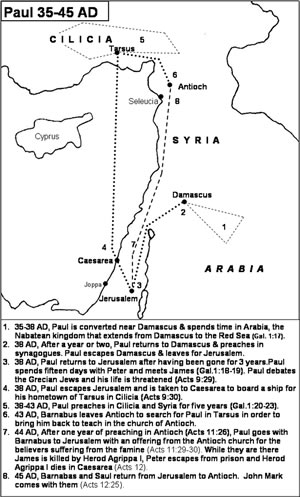| |

|
September 13 - Evening
"The Lord is good, a refuge in times of trouble.
He cares for those who trust in him,
but with an overwhelming flood he will make an end of Nineveh; he will pursue his foes into darkness."
- Nahum 1:7-8
|
 |
|
| The Fall of Nineveh |
|
|
The Lord is “good.” This is the basic nature of God.
For those who will flee to him and trust him he is a refuge and he will take care of them. The word
in the Hebrew for “care,” yada (commonly translated “know”), has an expansive range of meanings that include “knowing facts,” “knowing a person in a relationship,” “the performance of a skill,” and also “choose” or “care for.” In Nahum 1:7 yada is used as “care.” A similar Akkadian word was used by Nineveh in their religious texts to express the same “care” extended to the Assyrian king in
Nineveh by the Assyrian gods. A prophecy given to the Assyrian king Esarhaddon (681-669) by
his prophetesses who spoke oracles to him for Ishtar and other Assyrian gods refer to Ishtar
as “the god who ‘cares’ for you," and say, “I will keep you safe,” “Do not trust humans, but lift your eyes and look to me.” In his prophecy written to Nineveh (663-654), Nahum uses yada, “care,” to
refer to the “care” God could give to Nineveh.
Nineveh received this “goodness” from God in 759 BC when Jonah brought a message of
repentance to them, but since Jonah’s day the Assyrians have strayed far from the Lord, and
so, will now come to an end. They did not receive the protection promised to them by Ishtar,
Ashur or any of the other Assyrian gods. Nineveh will be overcome by a "flood" of military
activity beginning with the Scythians from the north in 626 BC, which is followed by an invasion
from the Babylonians from the east in 612 where Nineveh fell in fulfillment of Nahum's prophecy.
The fall of Nineveh in 612 BC ended the Assyrian empire. |
|
 |
"God makes greater haste
to the sinner than the
sinner does to God. God makes much of our
first inclination."
– Antony Farindon |
 |
“If I can’t believe that the spacecraft I fly assembled itself, how can I believe that the universe assembled
itself? I am convinced only
an intelligent God could
have built a universe
like this.”
– Jack Lousma, astronaut |
|
| |
 |
|
 |
Parakaleo (Gr) - "to call alongside" (Eng) - Parakaleo is a compound word from
the Greek preposition "para" meaning "beside" and "kaleo" meaning "to call."
Parakaleo was used originally to mean "to summon to one's aid for help or
encouragement." It is used in the New Testament at least 87 times and is translated
"urge", "plead", "appeal", "comfort", "exhort". The NT uses it in:
Romans 12:1, "I urge you brothers...to offer your bodies as living sacrifices."
1 Corinthians 1:10, "I appeal to you, brothers...that all of you agree with one another."
Epahesians 4:1, "I urge you to live a life worthy or the calling you have received."
Philippians 4:2, "I plead with Euodia and I plead with Syntyche to agree."
1 Peter 2:11, "I urge you, as aliens and strangers in the world, to abstain from sinful desires." |
|
Ezra 1:1-4 says Cyrus made
a proclamation to send the Jews back to Jerusalem to build their temple. In the
1879 Hormuzd Rassam
found the Cyrus Cylinder,
a ten-inch clay cylinder inscribed with cuneiform
with Cyrus’ decree that
set Israel free in 538 BC. Cyrus calls himself the “liberator of the people.” |
| |
|
|
 |
|
 |
Have I "come alongside" of the Truth?
I will walk alongside God's call by learning Word of God, letting it renew my thinking
and leading me into agreement with others believers in the Truth
and away from the sinful desires of the world.
|
|
" Whoever disregards discipline comes to poverty and shame, but whoever heeds correction is honored."
- Proverbs 13:18 |
| |
|
|
|
|
| |
|
 |
 |
 |
 |
| for my work |
evangelism |
revival
(click on Nation or World for daily updates) |
Nepal - church leadership and next generation of believers |
|
|
| |
 |
 |

The Roman Cardo (main north/south street) in ancient Jerusalem. On the left is the paved road. To the right of the pillars is the pedestrian walk in front of the stores, which are to the far right in the photo. The pillars supported a roof covering which made the sidewalk a colonade.
(click on image for larger size) |
|
 |
| |
Map of Paul's travels from his experience on the Damascus Road 35 AD until he flees Jerusalem to return to his home country of Cilicia in 38 AD and returns to Jerusalem in 45 AD. (click on image for larger size) |
| |
|
| Details and Explanation of Sets & Reps Devotional System Here |
 |
|
|
| |
| |
| |
| Reps & Sets is a daily Bible devotional for Christians from Generation Word Bible Teaching used each morning and evening. |
| |
|